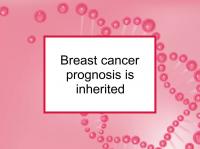Women with a family history of breast cancer have a higher risk of breast cancer even when they are not carriers of harmful BRCA1 or BRCA2 mutations. In fact, most women with a family history of breast cancer are not BRCA mutation carriers. The degree of extra familial risk varies according to the closeness of the relationship.
In other words, whether family members with breast cancer are first degree relatives (parent, sibling or child) or second degree relatives (grandparent, aunt/uncle, half-sibling), and whether the disease has been diagnosed in multiple family members. Breast cancer risk is inherited from the father's as well as the mother's side of the family.
Breast cancer patients with a parent who died from breast cancer are also more likely to die from it, even after taking account breast cancer type and other tumor characteristics. One study found that those with a parent who died of breast, prostate or colon cancer and who develop the same cancer as their parent are more likely to die from it than cancer patients without such a fatal family history.
Another study reported that breast cancer patients with mothers or sisters who die of breast cancer are almost five times more likely to die than those with mothers or sisters who survive breast cancer, even after adjusting for patient and tumor characteristics and type of treatment. Now a new study has reported that sisters have similar breast cancer survival rates, suggesting that treatment should be aggressive in women with sisters who died of breast cancer even if tumor characteristics appear favorable.
Family history drives breast cancer risk
A family history of breast cancer increases risk according to whether breast cancer was diagnosed among first degree relatives, second degree relatives, or multiple family members. One study reported that the excess risks were very similar for women whether the family history was a father (1.73 times the expected risk) or a mother (1.74 times) with breast cancer. Having at least two female first degree relatives with breast cancer increased the risk to approximately 2.8 times the expected risk.
When both parents had breast cancer, the risk of breast cancer was increased approximately tenfold. The risk for a woman increased more when a brother had breast cancer (2.48) than when a sister was affected (1.87). With respect to second degree relatives, having a grandmother with breast cancer was associated with lower familial excess risk than having an affected half sister (1.27 and 1.26, respectively, for maternal relatives; 1.39 and 1.50, respectively, for paternal relatives). Male breast cancer appears to have a stronger genetic basis than female breast cancer.
Latest research finds sisters have similar breast cancer survival
The study referenced at the beginning of this news story was designed to investigate whether sisters with breast cancer have similar survival outcomes. The study included all sister pairs (a total of 1,617 sisters) diagnosed with breast cancer in Sweden between 1992 and 2006, with available follow-up information. Estrogen receptor (ER) status was the only tumor characteristic significantly associated between the sisters.
In other words, sisters were likely to both have either ER+ or ER- tumors, but did not necessarily share other tumor characteristics. Results were adjusted for age, number of children, calendar period of diagnosis, socioeconomic factors, and hospital of original breast cancer diagnosis.
Patients with older sisters who died from breast cancer themselves were more than twice as likely to die as women with favorable older sister survival. The risk of breast cancer-specific death in younger sisters with poor older sister survival was even more pronounced (over three times the risk of death) when the results were adjusted for primary tumor characteristics and treatment.
The authors conclude that breast cancer-specific survival is inherited independent of tumor characteristics and treatment in sisters later diagnosed with the disease. Therefore, it might be useful to take into account prognostic information concerning a previously diagnosed sibling in the clinical management of breast cancer.
Please see our article on family history of breast cancer for more information.
